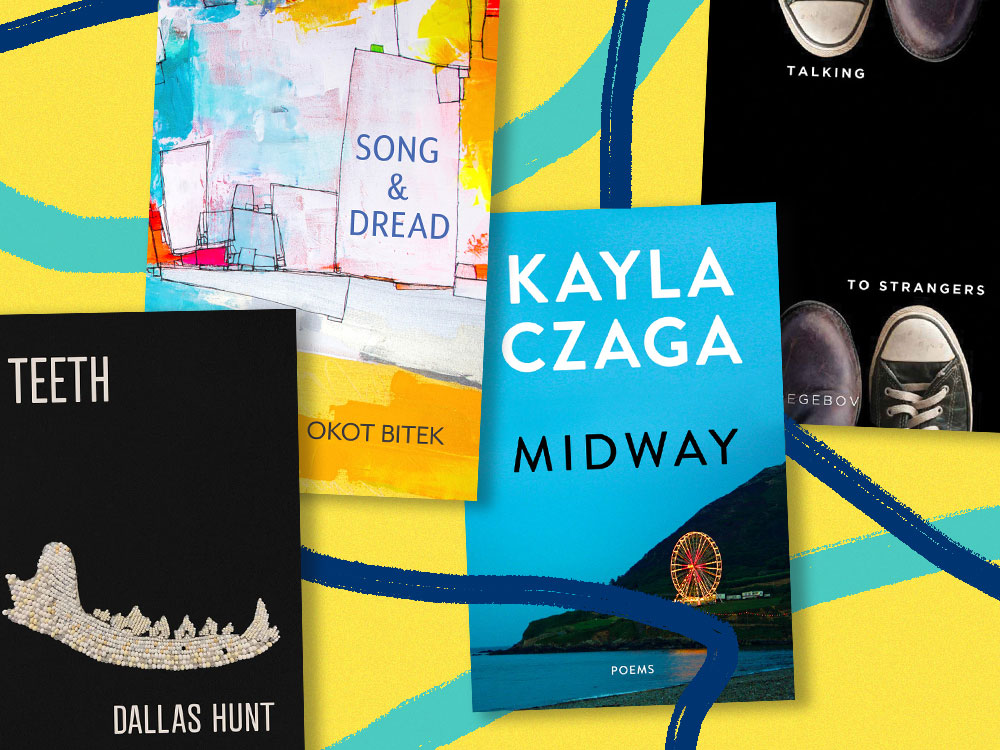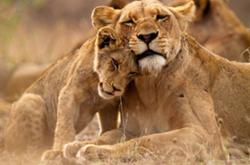April is national poetry month. And there are a lot of reasons to turn to the intimate practice of poetry, which allows us to reach for things in writing when we cannot quite utter them in everyday speech.
To celebrate this poetry month — and potentially offer ways to process all the various upheavals and atrocities of the news cycle — we are sharing poems excerpted from three collections out this spring (plus a bonus selection from last year).
‘Midway’ by Kayla Czaga
Victoria-based poet Kayla Czaga has a particularly special way with words — a mix of playfulness and poignancy that really sneaks up on you. Her debut, For Your Safety Please Hold On, won the Gerald Lampert Award, and was shortlisted for a Governor General’s Award and the Dorothy Livesay Poetry Prize, simultaneously introducing her poetry and establishing her as a key figure in contemporary literature. Czaga’s third book, Midway, published April 2, is an exploration of grief. Born in 1989, Czaga has now lost both her parents and must now learn what it means to live in the world without them.
Coho
Whenever I’m sad, I lift my fish book
off the shelf and let it fall open in my lap.
Today I got coho. I would’ve liked an eel
or even a smelt but I only get one flip.
That’s the game: one feeling, one flip.
Years ago, my father and I caught a salmon
so small we assumed we’d hooked weeds—
the bell he clipped to the tip of his rod
barely rattled. When we finally reeled in
there it was at the end of our line, limp
and tiny, like an infant’s filthy sock.
My father knelt down at the river’s edge
to unhook it. Cupping it in his palms,
he said, “I dunno. Might not make it.”
Each syllable came out with a little cloud.
Then the fish swam away. I wish it would
let me go, this feeling, but I like its warm
hands, the way it wears my father’s face.
'Coho' from Midway by Kayla Czaga. Copyright 2024 Kayla Czaga. Published by House of Anansi Press. 'Coho' has previously appeared in the Walrus.
‘Song & Dread’ by Otoniya J. Okot Bitek
Otoniya J. Okot Bitek’s 100 Days, which won the Glenna Luschei Prize for African Poetry and was shortlisted for the Robert Kroetsch Award for Poetry, among others, bore witness to the atrocities of the Rwandan genocide in 100 poems. Song & Dread bears witness in its own way: beginning on Pi Day 2020, Okot Bitek began documenting, as she writes in her author’s note, “how the media, the fear and lockdown came together in our lives.” As COVID-19 continues, carrying loss and pain, energy and fatigue, community and isolation, so Pi Day recurs in Okot Bitek’s poetic practice.
pi day 14
today an impossibly bent-over tree seeks my eye
skeletal branches budding this is the season
deep yellow forsythia this is the season
bluish-grey white cherry blossoms this is the season
large pink magnolia petals like tongues against the sky
this also is the season
this is the season
there has been a before
& there will be an after
with or without us
on these lands
'pi day 14' excerpted from 'Song & Dread' by Otoniya J. Okot Bitek. Copyright 2024 by Otoniya J. Okot Bitek. Reprinted with permission of Talonbooks.
‘Teeth’ by Dallas Hunt
Dallas Hunt’s first poetry collection, Creeland, was nominated for the George Ryga Award for Social Awareness in Literature, the Gerald Lampert Memorial Award and the Indigenous Voices Award. His newest, Teeth, out April 13 from Nightwood Editions, “grapples with the material realities and imaginaries Indigenous communities face, as well as the pockets of livability that they inhabit just to survive.” It is also about joy, and flourishing; about grief; about squirrels, and bears, and cavities; about what it means as an Indigenous poet to have one’s work be “legible” as Indigenous poetry.
kaskitew maskwa
nohtâwiy works for
the resource extraction
industry, and handles
pumpjacks, water
lines, he caresses
the tools he needs
and the wheel
of the bobcat
he putters
around in
in his work
boots, underneath
a high wooden
pole, nohtâwiy begins
to climb, to labour
up the pole to
a platform
one that holds
him and his
breath hand in
hand, ascending
upwards toward
smoke and invisible
violence, toxins
until he notices
a black bear, mal-
nourished, teeth
missing, using its
paws, clambering
after him
nohtâwiy continues
to scale the wooden
beam, but maskwa
is relentless, aching,
doggedly scampering
up the pole
he is starving
the reason that wooden
beam and all
of its platforms exist
is to pillage the earth,
to destroy the hunting
grounds that the black
bear needs for nourishment
for itself and other maskwak
a contract broken
between those who
inhabit a shared space.
nohtâwiy decides
to jump
onto a pumpjack
and shatters
his leg in the process
he walks
with a cane now
and that bear, and nine
others, will be put
down, to find the
culprit in all of
this, to sniff out
DNA and emaciation
aside from the leg
nohtâwiy now suffers
from social anxiety,
like most of us do,
including kaskitew maskwa,
the black bear, who
witnessed a world
crumble around them
nohtâwiy is afraid of
public spaces now
malls, hotels and
familiar haunts that
have been full, to
the gills, since he was
a child
nohtâwiy is afraid now
as though each person
has a bear in them
waiting to come
out, desperate
and aching and,
maybe they do
'kaskitew maskwa' excerpted from 'Teeth' by Dallas Hunt. Copyright 2024 by Dallas Hunt. Reprinted with permission of Nightwood Editions.
‘Talking to Strangers’ by Rhea Tregebov
Rhea Tregebov’s newest poetry collection, Talking to Strangers, also takes grief as one of its prongs of exploration. “I was smug in Grade One, judging the idolators / and their little gods as I learned that first / commandment. I continue smug, sure we’re / meat: matter not spirit,” Tregebov writes in “God.” So what does it mean to age, to lose friends and family, within this painful certainty? How do we do it? While Talking to Strangers doesn’t offer answers, it does offer rich moments of reflection.
Menial
Each time I drench the hydrangeas I have
the day Helen gave me their watery
needs and name. And when in my own kitchen
I drop three popcorn kernels into the pan,
then wait for their exact bursts, I hear John,
patient, tutoring me. Keep shaking the pan.
Dave’s large capable hands snapping
asparagus stalks for the grill, his knowing
where they want to break. Today I do not
want to slice cremini mushrooms for the quiche
I used to make Nancy. What alchemy
do I expect will feed those who no longer
need food? This is the year I count dead
friends, still count them on one hand.
'Menial' excerpted from 'Talking to Strangers' by Rhea Tregebov. Copyright 2024 by Rhea Tregebov. Reprinted with permission of Véhicule Press. ![]()
Read more: Books
















Tyee Commenting Guidelines
Comments that violate guidelines risk being deleted, and violations may result in a temporary or permanent user ban. Maintain the spirit of good conversation to stay in the discussion and be patient with moderators. Comments are reviewed regularly but not in real time.
Do:
Do not: